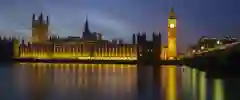


Want to see the world while you study? Spread your wings on our semester abroad. Or apply for our unique Westminster internship. The choice is yours.
This is the study of politics on a global scale. You’ll explore the themes and issues which drive 21st-century world politics. Conflict, poverty, inequality, trade, and more.
Our Politics and International Relations degree takes you behind the headlines to gain expertise in international affairs. And with the added bonus of a placement or studying abroad, you’ll graduate with standout experience on your CV.
About this course
This is an intellectually demanding programme, taught by staff who are recognised for their research. That's reflected in the range of modules available, and in the flexibility of the degree. You can tailor it to fit your interests and career aspirations.
You’ll focus on the most important debates. Possession and exercise of power. Wealth and inequality. Individual and collective identity. The use of violence for political ends. And by examining them, you’ll gain critical insights into the global significance of politics.
All our 3-year courses offer the option to study abroad for a trimester, whether in Europe, the USA or Hong Kong. And through our internship opportunities, you’ll get access to Parliament or another politics-related placement.
At Westminster, you’ll work alongside an MP or peer. Our links with a large pool of MPs mean we can likely match you with a politician whose role reflects your area of interest. While on placement, you'll enjoy access to our exclusive seminar series presented by senior Parliamentary officials including Black Rod and the Speaker.
Don't learn international politics.
Live it.
Module options
Each year, you’ll study modules worth a certain number of credits, and you need 120 credits per year. Most modules are 20 credits – so you’ll study six modules each year. Some longer modules, such as a dissertation, are worth more. In these cases, you’ll study fewer modules - but the number of credits will always add up to 120. Some modules are compulsory, some are optional, so you can build a course that’s right for you.
Filters
British Political History since 1945
The UK's political history after World War Two: from Eden to the EEC and from Wilson to the 'Winter of Discontent', encounter the people, ideas and policies that have shaped modern Britain.
compulsory
20 credits
Introduction to International Politics
Examine the theories that help us understand how the world around us works, and the themes and issues that are central to international discourse and practice. You'll explore arguments and ways of thinking that are designed to expand their sense of who you are and of where and how you fit in the world around you.
compulsory
20 credits
Introduction to Political Ideologies
Political action is collective action among people who share beliefs. This module explores the most important formulations of these collective views. It explores political ideologies that defend the status quo, those who wish to reform it, and those that seek a radically different political reality.
compulsory
20 credits
Introduction to Policy-Making
This module provides an introduction and explanation of the plural theories and models of policy making before applying these theories and models to the practice of policy-making, via a series of case studies of policy-making in practice.
compulsory
20 credits
Introduction to Global Political Economy
You'll gain the tools to understand and explain developments in the global political economy and be introduced to international political economy, one of the main sub-disciplines of politics and international relations. You will trace the evolution of ideas, institutions and policies related to global financial markets, transnational production, global division of labour, gender and climate change.
compulsory
20 credits
Introduction to War and Politics
Study the causes and conduct of war in modern times. Learn why the Allies won World War Two, why the US lost in Vietnam and how nuclear weapons affect international security.
compulsory
20 credits
International Relations Theory
This module examines the current state of international relations theory. You'll examine contending notions of security by exploring the concept of state sovereignty and the impact of the state upon individual and other forms of security.
compulsory
20 credits
The Global South and Development
Explore the challenges of development for the Global South from a cross-regional comparative political economy perspective. You'll gain an understanding of the theoretical and practical debates around development, and their implications for international relations. You'll also examine the role of states, markets, international organisations, non-governmental organisations and civil society in fostering (or inhibiting) development.
compulsory
20 credits
Research Methods and Ethics
In this module you will begin the journey of becoming an independent and autonomous political researcher. You will learn more about how Political Research – especially that conducted within the School of Politics and International Studies – is produced, and be equipped with the understanding and skills necessary to design your own political research project. This module will prepare you for the Final Year Project and for putting into practice your own programme of research.
compulsory
20 credits
Our facilities

Watchlist
BA Politics and International Relations
Course overview
2 mins
Law Facilities
Course Highlight
1 min
Daniel Wilton - Your course in their words
Student Story
2 mins
Life on campus
University life
2 mins
Featured academics
Learn from some of the UK’s leaders in political theory, British government, and international relations.
We're here to inspire you – tomorrow's leaders – to realise your potential. And to leave the world in a better condition than you found it.

Professor Mahrukh Doctor
Lecturer
Mahrukh has a special interest in business-state relations, trade and industry, ports, and foreign policy analysis in Latin America. She’s the author of Business-State Relations in Brazil: Challenges of the Port Reform Lobby.

Dr Christopher Fear
Lecturer
Christopher’s recent research focused on conservative political thought; historical and contemporary. Some of his publications in this area have appeared in the Journal of Political Ideologies, History of European Ideas, and The Review of Politics.
Entry Requirements
What do I need?
This course is currently available through Clearing, which means our entry requirements are a bit different to what they would normally be.
At Hull, you're a name not a number. During Clearing, we look at all of your qualifications and experience, not just your academic grades. We may be able to offer you a place whatever your situation. Get started by completing our eligibility checker, and find out immediately if you could study at the University of Hull.
Have questions? Our admissions team will be happy to help.
Fees & Funding
How much is it?

Future prospects
Our graduates are well known throughout the major UK political parties. So many of them now work in Westminster that they’ve become known as ‘the Hull Mafia’. But it’s not only Parliament that can open its doors to you. Our Politics degrees afford many more opportunities after you graduate.
You’ll gain the skills to research and examine information. To critically analyse evidence and construct robust arguments. Exactly the kind of attributes that many employers are looking for. As well as politics, many of our graduates go on to work in the media, the Civil Service, HM Armed Forces, and intelligence services. They also pursue careers in public relations, charities, and international organisations.
Become part of the next generation of futuremakers
Like what you've seen? Then it's time to apply.
The standard way is to apply through UCAS. This will give you the chance to showcase your skills qualities and passion for the subject, as well as providing us with your academic qualifications.
Not ready to apply yet?
Visit our next Open Day, and see all that the University of Hull has to offer. Talk to our lecturers about your subject, find out what university is really like from our current students, and take a tour of our beautiful campus and amazing facilities.
You may also be interested in...
95% employability (Politics) UK domicile full-time first degree leavers; Higher Education Graduate Outcomes statistics, for the academic year 2022/23, published by the Higher Education Statistics Agency June 2025.
Politics is ranked 2nd in Yorkshire for assessment and feedback. National Student Survey (NSS) 2025, HEIs only.
All modules presented on this course page are subject to availability and this list may change at any time.